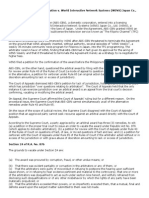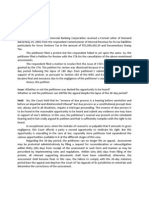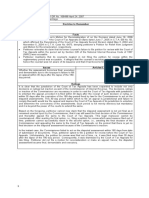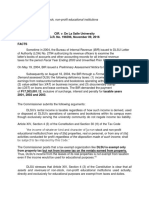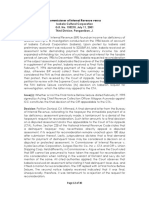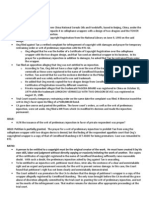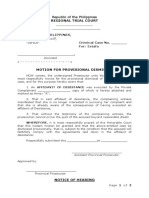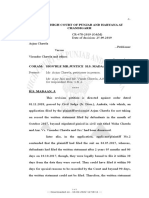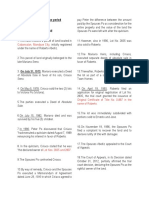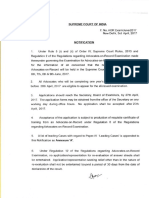Adamson vs. CA
Adamson vs. CA
Uploaded by
Aices SalvadorCopyright:
Available Formats
Adamson vs. CA
Adamson vs. CA
Uploaded by
Aices SalvadorCopyright
Available Formats
Share this document
Did you find this document useful?
Is this content inappropriate?
Copyright:
Available Formats
Adamson vs. CA
Adamson vs. CA
Uploaded by
Aices SalvadorCopyright:
Available Formats
LUCAS ADAMSON vs.
COURT OF APPEALS FACTS: A deficiency tax assessment was issued against Petitioners relating to their payment of capital gains tax and VAT on their sale of shares of stock and parcels of land. Subsequent to the preliminary conference, the CIR filed with the Department of Justice her Affidavit of Complaint against Petitioners. The Court of Appeals ultimately ruled that, in a criminal prosecution for tax evasion, assessment of tax deficiency is not required because the offense of tax evasion is complete or consummated when the offender has knowingly and willfully filed a fraudulent return with intent to evade the tax. Lucas Adamson and AMC sold 131,897 common shares of stock in Adamson and Adamson, Inc. (AAI) to APAC Holding Limited (APAC). The shares were valued at P7,789,995.00.[1] On June 22, 1990, P159,363.21 was paid as capital gains tax for the transaction. AMC sold to APAC Philippines, Inc. another 229,870 common shares of stock in AAI for P17,718,360.00. AMC paid the capital gains tax of P352,242.96. The Commissioner issued a Notice of Taxpayer to AMC, Lucas G. Adamson, Therese June D. Adamson and Sara S. de los Reyes, informing them of deficiencies on their payment of capital gains tax and Value Added Tax (VAT). The notice contained a schedule for preliminary conference.
G.R. No. 120935 Lucas G. Adamson, Therese June D. Adamson and Sara S. de los Reyes were charged before the Regional Trial Court (RTC) of Makati, Branch 150 in Criminal Case Nos. 94-1842 to 94-1846. They filed a Motion to Dismiss or Suspend the Proceedings. They invoked the grounds that there was yet no final assessment of their tax liability, and there were still pending relevant Supreme Court and CTA cases. Initially, the trial court denied the motion. A Motion for Reconsideration was however filed, this time assailing the trial courts lack of jurisdiction over the nature of the subject cases. On August 8, 1994, the trial court granted the Motion. It ruled that the complaints for tax evasion filed by the Commissioner should be regarded as a decision of the Commissioner regarding the tax liabilities of Lucas G. Adamson, Therese June D. Adamson and Sara S. de los Reyes, and appealable to the CTA. It further held that the said cases cannot proceed independently of the assessment case pending before the CTA, which has jurisdiction to determine the civil and criminal tax liability of the respondents therein. Court of Appeals reversed the trial courts decision and reinstated the criminal complaints. o The appellate court held that, in a criminal prosecution for tax evasion, assessment of tax deficiency is not required because the offense of tax evasion is complete or consummated when the offender has knowingly and willfully filed a fraudulent return with intent to evade the tax. o It ruled that private respondents filed false and fraudulent returns with intent to evade taxes, and acting thereupon, petitioner filed an Affidavit of Complaint with the Department of Justice, without an accompanying assessment of the tax deficiency of private respondents, in order to commence criminal action against the latter for tax evasion. G.R. No. 124557 AMC, Lucas G. Adamson, Therese June D. Adamson and Sara S. de los Reyes filed a letter request for reinvestigation with the Commissioner of the Examiners Findings earlier issued by the Bureau of Internal Revenue (BIR), which pointed out the tax deficiencies. On March 15, 1994 before the Commissioner could act on their letter-request, AMC, Lucas G. Adamson, Therese June D. Adamson and Sara S. de los Reyes filed a Petition for Review with the CTA. They assailed the Commissioners finding of tax evasion against them. The Commissioner moved to dismiss the petition, on the ground that it was premature, as she had not yet issued a formal assessment of the tax liability of therein petitioners.
On September 19, 1994, the CTA denied the Motion to Dismiss. It considered the criminal complaint filed by the Commissioner with the DOJ as an implied formal assessment, and the filing of the criminal informations with the RTC as a denial of petitioners protest regarding the tax deficiency. The Commissioner repaired to the Court of Appeals on the ground that the CTA acted with grave abuse of discretion. She contended that, with regard to the protest provided under Section 229 of the NIRC, there must first be a formal assessment issued by the Commissioner, and it must be in accord with Section 6 of Revenue Regulation No. 12-85. She maintained that she had not yet issued a formal assessment of tax liability, and the tax deficiency amounts mentioned in her criminal complaint with the DOJ were given only to show the difference between the tax returns filed and the audit findings of the revenue examiner. The Court of Appeals sustained the CTAs denial of the Commissioners Motion to Dismiss. Hence, this petition.
ISSUES: (1) Dis the CIR issue an assessment? (2) Must a criminal prosecution for tax evasion be preceded by a deficiency tax assessment? (3) Does the CTA have jurisdiction on the case? HELD: (1) NO. The recommendation letter of the Commissioner cannot be considered a formal assessment as (a) it was not addressed to the taxpayers; (b) there was no demand made on the taxpayers to pay the tax liability, nor a period for payment set therein; (c) the letter was never mailed or sent to the taxpayers by the Commissioner. It was only an affidavit of the computation of the alleged liabilities and thus merely served as prima facie basis for filing criminal informations. (2) YES. When fraudulent tax returns are involved as in the cases at bar, a proceeding in court after the collection of such tax may be begun without assessment considering that upon investigation of the examiners of the BIR, there was a preliminary finding of gross discrepancy in the computation of the capital gains taxes due from the transactions. The Tax Code is clear that the remedies may proceed simultaneously. (3) NO. While the laws governing the CTA have expanded the jurisdiction of the Court, they did not change the jurisdiction of the CTA to entertain an appeal only from a final decision of the Commissioner, or in cases of inaction within the prescribed period. Since in the cases at bar, the Commissioner has not issued an assessment of the tax liability of the Petitioners, the CTA has no jurisdiction.
You might also like
- ABS V WINSDocument2 pagesABS V WINSAices SalvadorNo ratings yet
- Adamson VsDocument4 pagesAdamson VsCarlos JamesNo ratings yet
- Adamson vs. Court of Appeals 2009Document3 pagesAdamson vs. Court of Appeals 2009joyce100% (1)
- Samar-I Electric Cooperative vs. CirDocument2 pagesSamar-I Electric Cooperative vs. CirRaquel DoqueniaNo ratings yet
- Cir vs. Metro Super Rama DigestDocument3 pagesCir vs. Metro Super Rama DigestClavel TuasonNo ratings yet
- RCBC V CIRDocument2 pagesRCBC V CIRPJ Hong100% (1)
- Lim Tian Teng CaseDocument1 pageLim Tian Teng CasedonsiccuanNo ratings yet
- Cir Vs United Salvage and Towage Case DigestDocument1 pageCir Vs United Salvage and Towage Case DigestjovifactorNo ratings yet
- Estate of Reyes V CIR Case DigestDocument2 pagesEstate of Reyes V CIR Case DigestAlexis Anne P. ArejolaNo ratings yet
- CIR vs. Enron Subic Power CorporationDocument1 pageCIR vs. Enron Subic Power CorporationArthur Archie TiuNo ratings yet
- CIR v. Fitness by DesignDocument4 pagesCIR v. Fitness by DesignJesi CarlosNo ratings yet
- Cir v. MeralcoDocument2 pagesCir v. MeralcoKhaiye De Asis AggabaoNo ratings yet
- RCBC Vs CIR, GR No. 168498, April 24, 2007Document1 pageRCBC Vs CIR, GR No. 168498, April 24, 2007Vel June De LeonNo ratings yet
- CIR vs. Metro Star Superama Inc.Document1 pageCIR vs. Metro Star Superama Inc.DaLe AparejadoNo ratings yet
- GR 220835 CIR vs. Systems TechnologyDocument2 pagesGR 220835 CIR vs. Systems TechnologyJoshua Erik Madria100% (1)
- Collector vs. BautistaDocument1 pageCollector vs. BautistaFrancise Mae Montilla Mordeno100% (1)
- Lascona Land Vs CIRDocument2 pagesLascona Land Vs CIRJOHN SPARKSNo ratings yet
- Cir V Hantex Trading Co, Inc. G.R. NO. 136975: March 31, 2005 Callejo, SR., J.: FactsDocument2 pagesCir V Hantex Trading Co, Inc. G.R. NO. 136975: March 31, 2005 Callejo, SR., J.: FactsKate Garo100% (2)
- CIR Vs Transitions Optical PhilippinesDocument2 pagesCIR Vs Transitions Optical PhilippinesJuls Rxs100% (1)
- 4 Philippine Journalists, Inc. vs. CIR (Tan)Document2 pages4 Philippine Journalists, Inc. vs. CIR (Tan)Rudejane TanNo ratings yet
- Gibbs vs. Cir and Cta - RemediesDocument2 pagesGibbs vs. Cir and Cta - RemediesIrish Asilo PinedaNo ratings yet
- Tax Rev Digest Mindanao II Geothermal Partnership V CirDocument4 pagesTax Rev Digest Mindanao II Geothermal Partnership V CirCalypso75% (4)
- CIR Vs Stanley PHDocument2 pagesCIR Vs Stanley PHAnneNo ratings yet
- 123 CIR v. Mirant Pagbilao CorporationDocument3 pages123 CIR v. Mirant Pagbilao CorporationLuis PerezNo ratings yet
- Metrobank V CIRDocument2 pagesMetrobank V CIRReena MaNo ratings yet
- CIR vs. Systems Technology InstituteDocument2 pagesCIR vs. Systems Technology InstituteMaria100% (3)
- Oceanic Wireless Network v. CIR - G.R. No. 148380 (2005)Document3 pagesOceanic Wireless Network v. CIR - G.R. No. 148380 (2005)SophiaFrancescaEspinosaNo ratings yet
- BPI vs. CIRDocument2 pagesBPI vs. CIRAldrin TangNo ratings yet
- CIR vs. Smart CommunicationsDocument1 pageCIR vs. Smart Communicationscorky01No ratings yet
- Part C 1 - CIR Vs Avon Products ManufacturingDocument4 pagesPart C 1 - CIR Vs Avon Products ManufacturingCyruz Tuppal75% (4)
- Digest of Ramsay vs. CIR, CTA Case No. 8456, September 17, 2015Document2 pagesDigest of Ramsay vs. CIR, CTA Case No. 8456, September 17, 2015Michael Joseph NogoyNo ratings yet
- Republic V Acebedo G.R No. L-20477 March 29, 1968Document2 pagesRepublic V Acebedo G.R No. L-20477 March 29, 1968PJ HongNo ratings yet
- Case #38 - CIR vs. United Cadiz SugarDocument2 pagesCase #38 - CIR vs. United Cadiz SugarJeffrey Magada100% (2)
- Lascona Land Co vs. CIRDocument2 pagesLascona Land Co vs. CIRAnneNo ratings yet
- BIR vs. CA, Spouses ManlyDocument1 pageBIR vs. CA, Spouses ManlyMich PadayaoNo ratings yet
- Systra Phils Inc v. CIRDocument1 pageSystra Phils Inc v. CIRBRYAN JAY NUIQUENo ratings yet
- CIR Vs Next MobileDocument2 pagesCIR Vs Next Mobilegeorge almeda100% (1)
- Commissioner of Internal Revenue Vs Standard Chartered BAnkDocument2 pagesCommissioner of Internal Revenue Vs Standard Chartered BAnkTonifranz Sareno100% (2)
- CIR Vs Hambrecht and Quist Phil IncDocument4 pagesCIR Vs Hambrecht and Quist Phil IncKM Mac100% (2)
- Asian Transmission Corp. vs. CIRDocument2 pagesAsian Transmission Corp. vs. CIRRhea Caguete50% (2)
- CIR v. DLSUDocument2 pagesCIR v. DLSUJoseph DimalantaNo ratings yet
- CIR Vs Perf RealtyDocument2 pagesCIR Vs Perf RealtyEnav LucuddaNo ratings yet
- Team Energy Corporation V CIR - DigestDocument1 pageTeam Energy Corporation V CIR - DigestKate GaroNo ratings yet
- Rizal Commercial Banking vs. CIRDocument3 pagesRizal Commercial Banking vs. CIRMarife MinorNo ratings yet
- Samar Electric Cooperative vs. CIRDocument3 pagesSamar Electric Cooperative vs. CIRAnneNo ratings yet
- CIR v. Cadiz Sugar FarmersDocument6 pagesCIR v. Cadiz Sugar Farmersamareia yap100% (1)
- CIR Vs Toledo DigestDocument2 pagesCIR Vs Toledo DigestClar Napa100% (2)
- American Express International v. CIR CTA Case No. 6099 (April 19, 2002)Document2 pagesAmerican Express International v. CIR CTA Case No. 6099 (April 19, 2002)Francis Xavier Sinon100% (1)
- 10 CIR Vs Lancaster Case DigestDocument1 page10 CIR Vs Lancaster Case DigestAllanNo ratings yet
- Alcantara vs. Republic (Digest)Document1 pageAlcantara vs. Republic (Digest)Kristofer AralarNo ratings yet
- Aichi Forging Company of Asia Inc Vs Cta Enbanc and CirDocument2 pagesAichi Forging Company of Asia Inc Vs Cta Enbanc and CirJessica Nubla100% (1)
- Oceanic Wireless v. CIRDocument2 pagesOceanic Wireless v. CIRlesterjethNo ratings yet
- Fishwealth Canning Corporation Vs CirDocument2 pagesFishwealth Canning Corporation Vs CirKateBarrionEspinosaNo ratings yet
- CIR V Isabela Cultural Corp, GR No. 135210Document2 pagesCIR V Isabela Cultural Corp, GR No. 135210Lilaben SacoteNo ratings yet
- CIR vs. Isabela Cultural Corporation 135210Document1 pageCIR vs. Isabela Cultural Corporation 135210magenNo ratings yet
- Team Energy Corporation Vs CIRL GR 197663Document3 pagesTeam Energy Corporation Vs CIRL GR 197663JUAN MIGUEL GUZMAN0% (1)
- Republic V RicarteDocument1 pageRepublic V RicarteReena MaNo ratings yet
- CIR-vs-CA-GR-no-119322Document1 pageCIR-vs-CA-GR-no-119322Gyelamagne EstradaNo ratings yet
- Adamson vs. CIRDocument2 pagesAdamson vs. CIRJoshua OuanoNo ratings yet
- Tax 2 Case DigestDocument3 pagesTax 2 Case DigestBobbyNo ratings yet
- Feb 16 Cases OriginalsDocument53 pagesFeb 16 Cases OriginalsMsIc GabrielNo ratings yet
- People v. Dy, 395 SCRA 256 (2003)Document1 pagePeople v. Dy, 395 SCRA 256 (2003)Aices SalvadorNo ratings yet
- De Barrera vs. LegaspiDocument2 pagesDe Barrera vs. LegaspiAices SalvadorNo ratings yet
- 9 Lalicon and Lalicon Vs NHADocument2 pages9 Lalicon and Lalicon Vs NHAAices SalvadorNo ratings yet
- Osmeña v. Pendatun, 109 Phil. 863 (1960)Document2 pagesOsmeña v. Pendatun, 109 Phil. 863 (1960)Aices Salvador100% (3)
- Malbarosa V CADocument2 pagesMalbarosa V CAAices Salvador100% (1)
- People v. OrtillasDocument2 pagesPeople v. OrtillasAices Salvador50% (2)
- Magellan Capital V ZosaDocument2 pagesMagellan Capital V ZosaAices SalvadorNo ratings yet
- 200 - Republic v. Ramon YuDocument2 pages200 - Republic v. Ramon YuAices SalvadorNo ratings yet
- Aneco vs. LandesDocument1 pageAneco vs. LandesAices SalvadorNo ratings yet
- Articles On Contract Breaches of Migrant WorkersDocument4 pagesArticles On Contract Breaches of Migrant WorkersAices SalvadorNo ratings yet
- Tajanglangit V Southern MotorsDocument2 pagesTajanglangit V Southern MotorsAices SalvadorNo ratings yet
- Commission On Filipinos OverseasDocument10 pagesCommission On Filipinos OverseasAices SalvadorNo ratings yet
- Castellvi de Higgins vs. SellnerDocument1 pageCastellvi de Higgins vs. SellnerAices Salvador100% (1)
- De La Salle University - Manila College of Law Taft Avenue, ManilaDocument1 pageDe La Salle University - Manila College of Law Taft Avenue, ManilaAices SalvadorNo ratings yet
- Mergers ReviewerDocument3 pagesMergers ReviewerAices SalvadorNo ratings yet
- Mindanao Portland v. McDonoughDocument2 pagesMindanao Portland v. McDonoughAices SalvadorNo ratings yet
- Mindanao Portland v. McDonoughDocument2 pagesMindanao Portland v. McDonoughAices SalvadorNo ratings yet
- Outline in PersonsDocument30 pagesOutline in PersonsAices SalvadorNo ratings yet
- Ching Kian Chuan V CADocument1 pageChing Kian Chuan V CAAices SalvadorNo ratings yet
- Catly V NavarroDocument2 pagesCatly V NavarroAices SalvadorNo ratings yet
- Pascual V PascualDocument2 pagesPascual V PascualAices SalvadorNo ratings yet
- Mason V. Ca (G.R. No. 144662. October 13, 2003) Quisumbing, JDocument2 pagesMason V. Ca (G.R. No. 144662. October 13, 2003) Quisumbing, JAices SalvadorNo ratings yet
- Harold Broome, As of The Last Will and Testament of Raymond H. Broome, Deceased v. Antlers' Hunting Club, 595 F.2d 921, 3rd Cir. (1979)Document8 pagesHarold Broome, As of The Last Will and Testament of Raymond H. Broome, Deceased v. Antlers' Hunting Club, 595 F.2d 921, 3rd Cir. (1979)Scribd Government DocsNo ratings yet
- Jamal and Others V Uganda Oxygen LTD and Others (64 of 1995) 1997 UGSC 4 (14 April 1997)Document37 pagesJamal and Others V Uganda Oxygen LTD and Others (64 of 1995) 1997 UGSC 4 (14 April 1997)andrewwangalwatrumpNo ratings yet
- Tejano VSDocument3 pagesTejano VSMaine FloresNo ratings yet
- PIL Case Briefs 2 - Sources of International LawDocument66 pagesPIL Case Briefs 2 - Sources of International LawJen DominoNo ratings yet
- CORPO LAW ReviewDocument39 pagesCORPO LAW ReviewPea Del Monte AñanaNo ratings yet
- Regional Trial Court: Republic of The PhilippinesDocument2 pagesRegional Trial Court: Republic of The Philippinestim timNo ratings yet
- Consti Review NOTESDocument3 pagesConsti Review NOTESCacaCamenforteNo ratings yet
- CR 478 2019 25 09 2019 Final OrderDocument5 pagesCR 478 2019 25 09 2019 Final Orderneha chawlaNo ratings yet
- People Vs KalaloDocument1 pagePeople Vs KalaloKaia Mac100% (1)
- Floresca V Philex - DigestDocument1 pageFloresca V Philex - DigestDarby Joya100% (2)
- 19 CHUA Solla V AscuentaDocument41 pages19 CHUA Solla V AscuentasupergarshaNo ratings yet
- Stainback v. Mo Hock Ke Lok Po, 336 U.S. 368 (1949)Document14 pagesStainback v. Mo Hock Ke Lok Po, 336 U.S. 368 (1949)Scribd Government DocsNo ratings yet
- Internship Report 2023-2Document64 pagesInternship Report 2023-2Kajal Dnyaneshwar MhasalNo ratings yet
- Aboitiz Vs Po DigestDocument3 pagesAboitiz Vs Po DigestJupert Jericho Mercader Remollo100% (1)
- 8 - Sarmiento v. Spouses Sun-CabridoDocument7 pages8 - Sarmiento v. Spouses Sun-CabridoDong HyuckNo ratings yet
- Amended Complaint Benitez v. City of New YorkDocument80 pagesAmended Complaint Benitez v. City of New YorkDavid Brand100% (1)
- Max Miller Lawsuit Against Stephanie GrishamDocument13 pagesMax Miller Lawsuit Against Stephanie GrishamWKYC.com0% (1)
- Property de Leon Notes PDFDocument3 pagesProperty de Leon Notes PDFClarisseOsteria50% (4)
- Ricardo A. Renteria-Piedrahita v. W.J. Thompson, Warden, Fci Morgantown, Wv Fedearl Bureau of Prisons Janet Reno, Attorney General of the United States U.S. Immigration & Naturalization Service, 73 F.3d 358, 4th Cir. (1996)Document2 pagesRicardo A. Renteria-Piedrahita v. W.J. Thompson, Warden, Fci Morgantown, Wv Fedearl Bureau of Prisons Janet Reno, Attorney General of the United States U.S. Immigration & Naturalization Service, 73 F.3d 358, 4th Cir. (1996)Scribd Government DocsNo ratings yet
- Monzon V RelovaDocument10 pagesMonzon V RelovaIsh GuidoteNo ratings yet
- R.A. 1125 Creating The Court of Tax AppealsDocument6 pagesR.A. 1125 Creating The Court of Tax AppealsJose Van TanNo ratings yet
- Church of Scientology Responds To Vanity Fair's October Article "What Katie Didn't Know"Document2 pagesChurch of Scientology Responds To Vanity Fair's October Article "What Katie Didn't Know"Alex RodriguezNo ratings yet
- Law485 Oct 2008Document4 pagesLaw485 Oct 2008Khairul Ridzuan Bin MalikNo ratings yet
- Palacio vs. Fely Transportation Co., 5 SCRA 1011 (1962)Document3 pagesPalacio vs. Fely Transportation Co., 5 SCRA 1011 (1962)VINCENTREY BERNARDONo ratings yet
- Supreme Court of IndiaDocument10 pagesSupreme Court of IndiaRam PatilNo ratings yet
- Haryana Land Acquisition PolicyDocument32 pagesHaryana Land Acquisition PolicybhattaparsaulNo ratings yet
- 4.08 Intermediate Category of Taxation and Attorney and Own Client CostsDocument4 pages4.08 Intermediate Category of Taxation and Attorney and Own Client CostsBarbraNo ratings yet
- LINA CALILAP-ASMERON, Petitioner vs. Development Bank of The Philippines, RespondentsDocument3 pagesLINA CALILAP-ASMERON, Petitioner vs. Development Bank of The Philippines, RespondentsDee SalvatierraNo ratings yet
- Chapter 1 - AcceptanceDocument7 pagesChapter 1 - AcceptanceSairNo ratings yet
- Octavio Ugarte Delgado, A205 829 687 (BIA Mar. 13, 2014)Document6 pagesOctavio Ugarte Delgado, A205 829 687 (BIA Mar. 13, 2014)Immigrant & Refugee Appellate Center, LLCNo ratings yet
